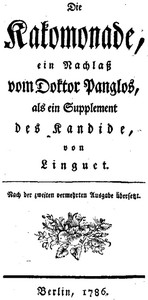Die Kakomonade by Simon Nicolas Henri Linguet
"Die Kakomonade" by Simon Nicolas Henri Linguet is a satirical novel written in the late 18th century. The text appears to explore themes of disease, human vice, and societal norms through the metaphor of a fictional affliction, the "Kakomonade," which seems to draw connections between personal indulgences and wider social consequences. The narrative hints at a connection to existing philosophical ideas, particularly referencing the character Dr. Pangloss from Voltaire's "Candide." The opening
of the narrative sets the stage for a philosophical exploration of the Kakomonade, comparing it to two infamous sisters that personify certain human follies and societal issues. It describes how these sisters have silently influenced human affairs for thousands of years before they began to exert their power more overtly around the 15th century. The text intertwines humor and serious reflection as it discusses the historical and social context of the Kakomonade, suggesting that it serves as a metaphor for the darker side of human nature, especially regarding the intersection of pleasure and disease. Through this allegorical approach, Linguet appears to embark on a critical examination of morality and consequence, potentially inviting readers into a deeper philosophical discussion heartened with a satirical humor drawn from the absurdities of human behavior. (This is an automatically generated summary.)
Read or download for free
| How to read | Url | Size | |||
|---|---|---|---|---|---|
| Read now! | https://www.gutenberg.org/ebooks/39043.html.images | 187 kB | |||
| EPUB3 (E-readers incl. Send-to-Kindle) | https://www.gutenberg.org/ebooks/39043.epub3.images | 157 kB | |||
| EPUB (older E-readers) | https://www.gutenberg.org/ebooks/39043.epub.images | 158 kB | |||
| EPUB (no images, older E-readers) | https://www.gutenberg.org/ebooks/39043.epub.noimages | 134 kB | |||
| Kindle | https://www.gutenberg.org/ebooks/39043.kf8.images | 232 kB | |||
| older Kindles | https://www.gutenberg.org/ebooks/39043.kindle.images | 211 kB | |||
| Plain Text UTF-8 | https://www.gutenberg.org/ebooks/39043.txt.utf-8 | 164 kB | |||
| Download HTML (zip) | https://www.gutenberg.org/cache/epub/39043/pg39043-h.zip | 145 kB | |||
| There may be more files related to this item. | |||||
Similar Books
About this eBook
| Author | Linguet, Simon Nicolas Henri, 1736-1794 |
|---|---|
| Title |
Die Kakomonade Ein Nachlaß vom Doktor Panglos, als ein Supplement des Kandide |
| Alternate Title |
Die Kakomonade Ein Nachlass vom Doktor Panglos, als ein Supplement des Kandide |
| Note | Reading ease score: 68.3 (8th & 9th grade). Neither easy nor difficult to read. |
| Credits | Produced by Jens Sadowski |
| Language | German |
| LoC Class | PQ: Language and Literatures: Romance literatures: French, Italian, Spanish, Portuguese |
| LoC Class | RC: Medicine: Internal medicine |
| Subject | Syphilis |
| Subject | Voltaire, 1694-1778. Candide |
| Subject | Sexually transmitted diseases |
| Category | Text |
| EBook-No. | 39043 |
| Release Date | Mar 4, 2012 |
| Most Recently Updated | Mar 5, 2012 |
| Copyright Status | Public domain in the USA. |
| Downloads | 146 downloads in the last 30 days. |
| Project Gutenberg eBooks are always free! | |


